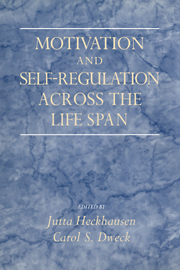20 results
25 - Mindsets
-
-
- Book:
- Pillars of Social Psychology
- Published online:
- 29 September 2022
- Print publication:
- 15 September 2022, pp 213-219
-
- Chapter
- Export citation
44 - Intelligence and Motivation
- from Part VIII - Intelligence and Allied Constructs
-
-
- Book:
- The Cambridge Handbook of Intelligence
- Published online:
- 13 December 2019
- Print publication:
- 16 January 2020, pp 1061-1086
-
- Chapter
- Export citation
62 - Mindsets: From the Classroom to the Middle East
- from Section A - Motivation
-
-
- Book:
- Scientists Making a Difference
- Published online:
- 05 August 2016
- Print publication:
- 11 August 2016, pp 293-296
-
- Chapter
- Export citation
Contributors
-
-
- Book:
- The Cambridge Handbook of Intelligence
- Published online:
- 05 June 2012
- Print publication:
- 30 May 2011, pp xi-xiv
-
- Chapter
- Export citation
Chapter 37 - Intelligence and Motivation
- from Part VIII - Intelligence in Relation to Allied Constructs
-
-
- Book:
- The Cambridge Handbook of Intelligence
- Published online:
- 05 June 2012
- Print publication:
- 30 May 2011, pp 748-770
-
- Chapter
- Export citation
Why we don't need built-in misbeliefs
-
- Journal:
- Behavioral and Brain Sciences / Volume 32 / Issue 6 / December 2009
- Published online by Cambridge University Press:
- 28 January 2010, pp. 518-519
-
- Article
- Export citation
List of Contributors
-
- Book:
- Motivation and Self-Regulation across the Life Span
- Published online:
- 24 September 2009
- Print publication:
- 28 October 1998, pp ix-x
-
- Chapter
- Export citation
Introduction
-
-
- Book:
- Motivation and Self-Regulation across the Life Span
- Published online:
- 24 September 2009
- Print publication:
- 28 October 1998, pp 1-12
-
- Chapter
- Export citation
Frontmatter
-
- Book:
- Motivation and Self-Regulation across the Life Span
- Published online:
- 24 September 2009
- Print publication:
- 28 October 1998, pp i-iv
-
- Chapter
- Export citation
I - Regulation of Self, Action, and Development
-
- Book:
- Motivation and Self-Regulation across the Life Span
- Published online:
- 24 September 2009
- Print publication:
- 28 October 1998, pp 13-14
-
- Chapter
- Export citation
Preface and Acknowledgments
-
- Book:
- Motivation and Self-Regulation across the Life Span
- Published online:
- 24 September 2009
- Print publication:
- 28 October 1998, pp vii-viii
-
- Chapter
- Export citation
Contents
-
- Book:
- Motivation and Self-Regulation across the Life Span
- Published online:
- 24 September 2009
- Print publication:
- 28 October 1998, pp v-vi
-
- Chapter
- Export citation
10 - The Development of Early Self-Conceptions: Their Relevance for Motivational Processes
-
-
- Book:
- Motivation and Self-Regulation across the Life Span
- Published online:
- 24 September 2009
- Print publication:
- 28 October 1998, pp 257-280
-
- Chapter
- Export citation
III - Functional and Dysfunctional Control-Related Behavior in Childhood
-
- Book:
- Motivation and Self-Regulation across the Life Span
- Published online:
- 24 September 2009
- Print publication:
- 28 October 1998, pp 235-236
-
- Chapter
- Export citation
IV - Developmental Goals in Adulthood
-
- Book:
- Motivation and Self-Regulation across the Life Span
- Published online:
- 24 September 2009
- Print publication:
- 28 October 1998, pp 339-340
-
- Chapter
- Export citation
Name Index
-
- Book:
- Motivation and Self-Regulation across the Life Span
- Published online:
- 24 September 2009
- Print publication:
- 28 October 1998, pp 437-446
-
- Chapter
- Export citation

Motivation and Self-Regulation across the Life Span
-
- Published online:
- 24 September 2009
- Print publication:
- 28 October 1998
II - Social Determinants of Motivation
-
- Book:
- Motivation and Self-Regulation across the Life Span
- Published online:
- 24 September 2009
- Print publication:
- 28 October 1998, pp 135-136
-
- Chapter
- Export citation
Subject Index
-
- Book:
- Motivation and Self-Regulation across the Life Span
- Published online:
- 24 September 2009
- Print publication:
- 28 October 1998, pp 447-461
-
- Chapter
- Export citation
8 - Social motivation: Goals and social-cognitive processes. A comment
-
-
- Book:
- Social Motivation
- Published online:
- 22 October 2009
- Print publication:
- 13 September 1996, pp 181-196
-
- Chapter
- Export citation



